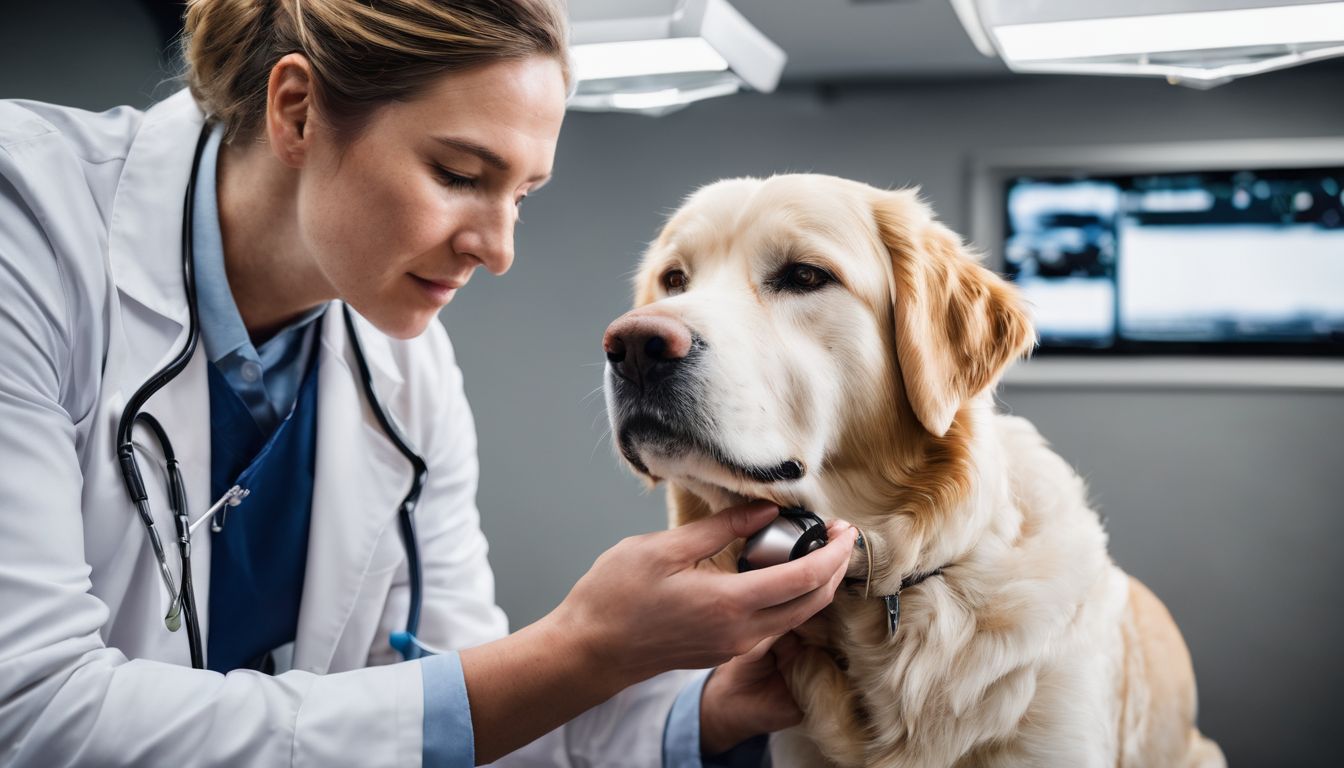Noticed why does my dog sound congested? You need to know that congestion in dogs can be caused by numerous factors such as allergies, colds, or even heart disease.
In this blog post, we’ll provide an insightful look into why your furry friend might be sounding congested – from potential health issues to steps you can take for relief. Keep reading and equip yourself with vital knowledge for better canine health!

Key Takeaways
- Dog congestion can be caused by allergies, respiratory infections, obesity, age – related factors, dental issues, and medication side effects.
- Signs of dog congestion include snorting or honking sounds, labored breathing or wheezing, runny or stuffy nose, coughing and hacking, difficulty swallowing or gagging, fever or coughing up phlegm.
- To help a congested dog: rule out potential causes like allergies or respiratory infections; provide home remedies such as keeping them hydrated, using a humidifier and saline nasal drops for relief; seek veterinary attention if symptoms worsen or are accompanied by coughing/hacking.
Understanding Dog Congestion
Dog congestion occurs when there is a blockage or narrowing of the airways in dogs, leading to difficulty breathing and a congested sound.
Causes of dog congestion
Dogs can sound stuffy for many reasons. Here is a list of common causes:
- Seasonal allergies make your dog’s nose runny and his throat hurt.
- A common cold can also make dogs sound blocked up.
- Dogs with heart disease may have fluid in their lungs, which makes them congested.
- Sometimes, the shape of a dog’s nose or throat makes it hard for them to breathe.
- If your dog is too heavy, he may have trouble breathing.
- Sometimes, dogs can have an allergic reaction that makes them congested.
- Dogs can get stuffy if something gets stuck in their throat or nose.
- Infections in the chest or throat can cause stuffiness.
- Tumors in the chest or throat can block airways and cause congestion.
- Finally, some dogs get illnesses that mess with their breathing system and make them sound stuffy.
Common signs and symptoms of congestion in dogs
- Dogs may make snorting or honking sounds when congested.
- Labored breathing or wheezing can be a sign of congestion in dogs.
- Dogs with congestion may have a runny or stuffy nose.
- Coughing and hacking are common symptoms of dog congestion.
- Congested dogs may have difficulty swallowing or gagging.
- Some dogs may experience fever or cough up phlegm when congested.
- Reverse sneezing, which is rapid inhalation through the nose, can be a sign of congestion in dogs.

Potential Health Issues Related to Dog Congestion
Dog congestion can be a sign of allergies and respiratory infections, obesity and age-related factors, as well as dental issues and medication side effects.
Allergies and respiratory infections
Allergies and respiratory infections can also contribute to dog congestion. Just like humans, dogs can be allergic to certain substances such as pollen, dust mites, or certain foods.
These allergies can cause inflammation in the nasal passages and lead to congestion. Respiratory infections, such as kennel cough or rhinitis, can also result in congested breathing for dogs.
It’s important to keep an eye out for symptoms like coughing, sneezing, or a runny nose if you suspect your dog may have allergies or a respiratory infection. If you notice any of these signs, it’s best to consult with your veterinarian for proper diagnosis and treatment options.
Obesity and age can contribute to congestion in dogs. Being overweight puts extra strain on the respiratory system, making it harder for your dog to breathe properly. As dogs age, their muscles may weaken, including those involved in breathing, which can lead to congestion and difficulty in breathing.
It’s important to keep your dog at a healthy weight through proper diet and exercise, especially as they get older. Regular check-ups with a veterinarian can help monitor any age-related changes that may be affecting your dog’s respiratory health.
Dental issues and medication side effects
Dog congestion can also be linked to dental issues and side effects from certain medications. Dental problems like gum disease, tooth infections, or oral tumors can lead to nasal congestion in dogs.
Medication side effects, such as dry mouth or changes in saliva production, can also cause a congested sound. It’s important to keep your dog’s teeth and gums healthy through regular dental care and check-ups with the veterinarian.
If you suspect that medication is causing your dog’s congestion, consult with your vet for alternative options or adjustments to the dosage. Always monitor your dog for any additional symptoms or changes in behavior when they are experiencing congestion.

How to Help a Congested Dog
To help a congested dog, start by ruling out any potential causes and triggers. Provide home remedies such as steam therapy or saline nasal drops to offer relief. If the congestion persists or worsens, it is crucial to seek veterinary attention for proper diagnosis and treatment.
Rule out potential causes
To help your congested dog, it’s important to rule out potential causes. Here are some things to consider:
- Check for any signs of allergies, such as sneezing or itching.
- Make sure your dog doesn’t have any respiratory infections or illnesses.
- Take a look at their weight – obesity can contribute to congestion.
- Examine their teeth and gums for any dental issues that could be causing the congestion.
- Consider if they’re taking any medications that may have side effects related to congestion.
Provide home remedies and relief
If your dog is congested, there are some things you can do at home to provide relief. Here are some home remedies that may help:
- Keep your dog properly hydrated by ensuring they have access to fresh water at all times.
- Use a humidifier in the room where your dog spends most of their time. This can help moisten the air and alleviate congestion.
- Keep your dog’s environment clean by regularly cleaning their bedding, toys, and living area. This can help reduce allergens and irritants that may contribute to congestion.
- If you know what triggers your dog’s allergies, try to avoid exposing them to those allergens as much as possible.
- Use saline nasal drops or sprays specifically made for dogs to help clear their nasal passages.
- Encourage gentle exercise to help promote better breathing and airflow in the respiratory system.
- Steam therapy can be beneficial for congested dogs. You can create steam in a closed bathroom by running hot water in the shower or bath and letting your dog breathe in the warm, moist air for a short period of time.
- Congestive Heart Failure in Dogs
- Rhinitis In Dogs: Everything You Need To Know
Seek veterinary attention if necessary
If your dog’s congestion is accompanied by coughing, hacking, or a fever, it is important to seek veterinary attention. These symptoms could indicate a more serious underlying health issue that requires medical treatment.
Your veterinarian will be able to assess your dog’s condition and provide appropriate care. Remember to monitor your dog for any additional symptoms or changes in behavior as well.
It’s always better to be safe and have a professional examine your furry friend if you are concerned about their congestion.

Conclusion
In conclusion, understanding why your dog has a congested sound is important for their overall health. It could be caused by allergies, respiratory infections, or other underlying health issues.
Monitoring your dog’s symptoms and seeking veterinary attention if necessary is crucial in helping them find relief and live a comfortable life. Remember to provide proper care and follow any medical advice given by professionals to ensure your furry friend stays healthy and happy.
FAQs
1. What causes a dog’s congested sound?
A dog’s congested sound can be due to nasal congestion, allergies in dogs, respiratory infections, or even laryngeal paralysis.
2. Can dogs have respiratory issues like humans?
Yes, dogs can face breathing problems from conditions such as Brachycephalic Upper Airway Syndrome and Kennel Cough, which contribute to snoring and congested breathing.
3. Why is my dog sneezing and panting more than usual?
It might be due to common health issues like kennel cough or allergies causing congestion symptoms in your dog’s respiratory system.
4. Are some breeds of dogs more prone to breathing difficulties?
Yes, Brachycephalic dog breeds often have more snoring and congestion because of their short noses leading to nasal congestion and other respiratory issues.
5. How would I know if my dog has a respiratory infection?
Signs of respiratory infections in dogs include coughing, wheezing, increased panting or having difficulty with normal breathing
6. What should I do if my dog shows signs of laryngeal paralysis?
If you notice your canine friend struggling with congested sounds or showing any other sign related to this issue; it’s best to see a vet right away for the correct advice on treating this particular canine health issue.


